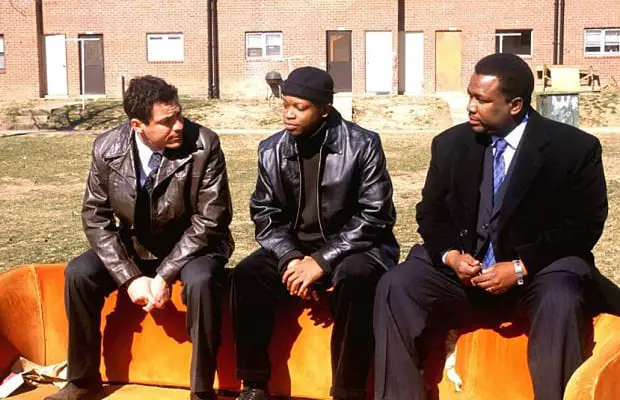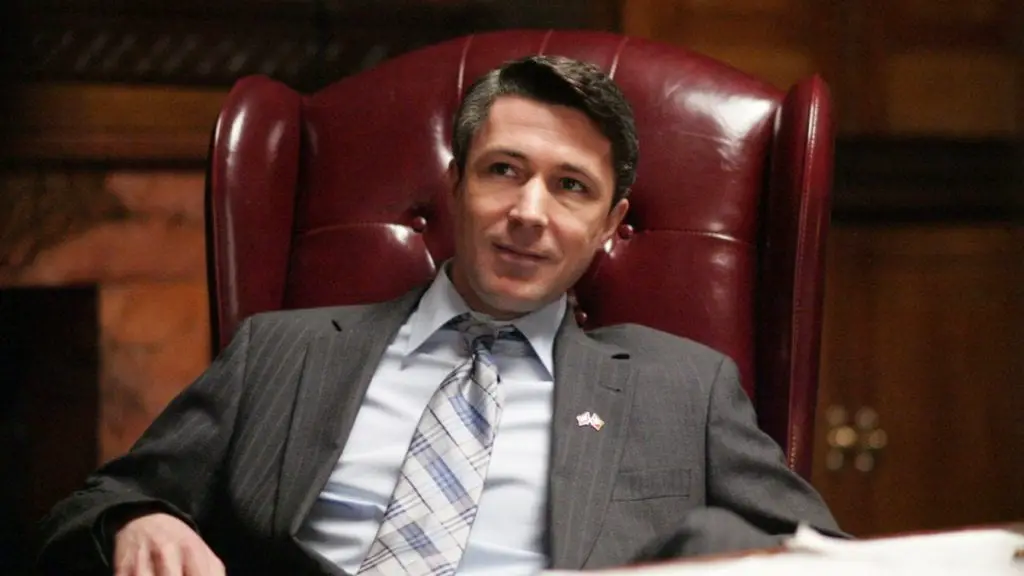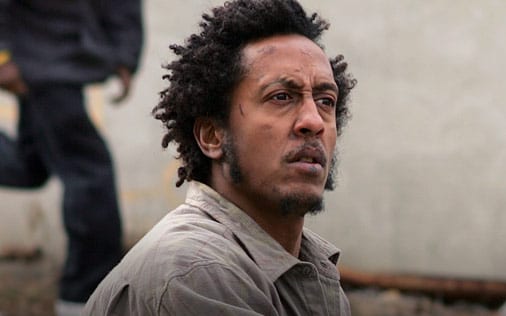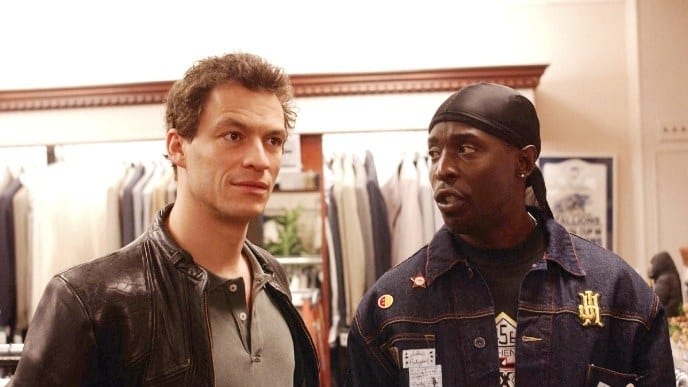Underrated and underappreciated in its time, The Wire has reached something of a symbolic status in TV history. It’s one of Those shows. The ones you know you should watch as a fan of TV but never have. If ask online or among friends about the greatest TV shows ever, someone will mention The Wire. Typically the holy trinity goes The Sopranos, The Wire, and Breaking Bad. But where everyone has seen The Sopranos and Breaking Bad, The Wire remains one of those under-seen shows that we have all heard of but many haven’t watched.
Here we are, 10 years later, and fans of The Wire are still desperately recommending it to everyone who asks. We still speak glowingly and without reservation. Every few weeks you’ll see someone online who just discovered it and been converted. The great test of time takes a toll on every story, and many feel left behind. This is especially true of TV, in the post-HBO world, where movie-quality dramas have reached a golden age where too many exist to possibly watch them all.
10 years later, The Wire still stands tall. It remains every bit as powerful, fresh, and relevant as ever. Perhaps it’s fitting for our Great American Novel to be a TV show, but I can’t think of a better way to describe it. The Wire IS a novel; a sprawling tale of an American city on the decline and the forces both fighting this decline and perpetuating it. And somehow they managed to translate that novel into a television show.
Among the holy trinity of TV mentioned above, you can already see how time has affected them. The Sopranos was unquestionably groundbreaking and influential, but someone accustomed to the current Golden Age of TV dramas might look back and wonder what the big deal is. Everything The Sopranos did first has been done since and in some cases far better, so it doesn’t feel as impactful. Breaking Bad is starting to feel the same way, though it’s still recent enough to hold up strongly. Both remain fantastic shows to watch, but so much of what made them cultural juggernauts has been lost to time.
The Wire has remarkably escaped this decline in its impact. There numerous reasons why, but above all I think they’ve avoided the decline because of how stunningly informative and relevant it remains to America today.

Criminal (in)Justice
Those who have not watched The Wire but have seen the premise may wonder what the big deal. There are dozens and dozens of cop shows out there. What makes this one special? Just because it’s a more accurate and socially aware cop show doesn’t mean it’s not a cop show, right? Wrong. The Wire ascends far above its cop show premise.
Now at its core, the show does revolve around the Baltimore police department and the criminals they investigate. However, they use this well-tread setup to do something half-assed by other shows at best and ignored far more often; to truly explore the militarization of modern police work and the harmful cycle it perpetuates. Why do police chase stats and quotas? Why has the war on drugs been so ineffective? What creates the atmosphere of prejudice and abuse between the police and black communities? Using this starting point, The Wire examines a familiar, ugly side of America that strikes at the heart of racial issues proving unfortunately prevalent to this day.
Main characters on both sides of the law and at all levels reveal the patterns which continue the cycle of racial tension between cops and the communities they serve. The main characters include detectives, commissioners, mayors, drug bosses, the corner boys doing the actual work, their children, foreign crime groups, state officials, beat cops, and many more. The Wire often draws direct parallels between them in order to blur the moral lines. Are the teenagers working drug corners really worse than the cops who take pleasure in crashing those corners? What makes Bodie any worse than Officer Eddie Walker, who steals from kids and breaks their fingers?
I suppose it might be more accurate to say The Wire compares the police to their communities, rather than the drug dealers alone. The neighborhoods of Baltimore are filled with the same mix of good and bad as the police sworn to protect them. Some take an active role in making things worse. Some try to fight and fail. Then you have the in-between, the characters like Bubbles or the season 2 dock workers who end up as victims of the struggle over Baltimore’s heart.
In the end, it feels like the higher ups of both sides of the conflict are more concerned with feeding their ambition than ending things. The mayor needs his crime stats for reelection, so the police go out and bust corners for cheap arrests to make him look good. The police commissioner is worried about keeping his job, so he goes along with it. The dealers controlling the corners care more about their own selfish success than helping their communities improve.
The result is the radicalization of their underlings, as wonderfully explained in D’Angelo’s explanation of chess in season 1. It creates a feeling of bitterness and anger they direct towards the other side of the fight, rather than those responsible for their circumstances. It’s a feeling fostered by those higher-ups manipulating the situation towards their ends. It’s unfortunately easy to stoke racial fires and fear of the “other” as a way of directing anger away from yourself.
The Wire also feels like both the culmination of the violence created by the War on Drugs, as well as a precursor to police forces today who arm themselves like private armies. You get a sense from the show that this is just the way things are, and they’ve been that way so long that no one wants to upset the system.
Some characters try and get smacked down for it. Detective Jimmy McNulty, probably the closest thing to a main character on the show, spends most of the first and final season trying to buck the system in the name of actual police work. Another detective, Lester Freeman, tries numerous times to follow money trails to fight corruption, only to be stonewalled every time. Stringer Bell tries to end drug wars by joining a coop effort with Baltimore’s other major dealers. Then Avon Barksdale ruins it for him. The coop continues without him until Marlo tears it apart.
For the most part, the anger turns against the “other” instead of the system. Feelings of powerlessness against their superiors lead the police to blame the kids on the corners and take their frustrations out on them. What you see by the time The Wire rolls around is a deeply personal fight that has created intense prejudices.
You also have to factor in who exactly applies to be a police officer. The Baltimore police of The Wire face a very familiar problem, which is ability to attract and recruit talent. This leaves the stereotypical view of police, the worst candidates who view a career in law enforcement as a way to hold power over people. Baltimore’s police doesn’t feel like a group of people who want to protect the community. It feels full of the violent and the opportunistic.
Then when the mayor tries to give his commissioner a raise competitive with other police forces, he can’t find the money to do so.
I don’t think it’s any stretch to recognize American police today as, at the very least containing racist policies. In some cities you would call them outright racist as an institution. Black Americans are targeted and victimized by police at higher ratios than other Americans. The Wire does not shy away from this undercurrent of racism in the slightest. In fact, it delves right into it. Cops spew racism. A major character, who is white, shoots a black detective after mistaking him for a suspect. Another white detective arrests a black minister and mistreats him in the process, leading to his firing.
The opinion of the community plays a major role in determining political ambitions. Community leaders fight against the idea of white leaders in Baltimore, and a mayor can’t replace a corrupt and inept police commissioner because he has the support of the black ministers. The Wire establishes these lines of black vs. white, of dividing Baltimore along racial lines.
You get a sense of that in the world today; not just from the police, but in every aspect of American life. We are defined by our divides; whether it’s skin color, sexuality, urban vs. rural populations, American-born or an immigrant, and so forth. Despite coming along 10 years ago, The Wire feels like a show based on the extreme divides today. Divides that the American political system weaponizes to the detriment of the people.

Political Favors
I briefly touched on the politics already, but it honestly deserves its own section. The politics of The Wire explain a great majority of the show’s world as it exists and the actions its characters take. The politics of the police are established from the first episode, as McNulty uses his favor with a judge to create political pressure on his bosses. Commissioners and deputies and lieutenants all eye their political futures while making every decision. When season 2 rolls around, the main goal of the corrupt dock workers is to use their ill-gotten funds in lobbying efforts for construction projects saving their union.
Season 3 puts Baltimore politics in the spotlight with the introduction of Tommy Carcetti. Or as I like to call him, Aiden Gillen’s extended audition tape for the role of Petyr Baelish. Carcetti’s ambition and eventual run for mayor brings the mayoral office into the spotlight. You get a taste of the ugly side of the political scene. In the end you realize much the same thing that you do with the drug war; the system is the system, and no one wants to buck the system.
Carcetti starts off as a well-meaning city councilor. He certainly displays considerable ambition, but at his heart he pursues policies seeking genuine improvement for Baltimore. Then he runs for mayor and starts falling into the traps the system lays for him. He uses the suffering of the community as a way to attack his opponent. When he wins, he realizes the restraints of the system. Community leaders refuse to back him in firing the corrupt, inept police commissioner. Budget issues keep him from keeping promises to the police. He hides crimes that would harm his ambition.
Eventually, Carcetti gives up on Baltimore and makes a run for governor. The cycle continues.
Obviously political corruption is nothing close to a new concept in human existence. Where The Wire proves relevant to America today is in the purpose its corruption serves for the story. At its heart, The Wire is a story about a failing America city as a study of the factors plaguing modern American decline and a warning that those factors need to change.
So much of our political system is steeped in negativity. The prejudice of the “other” rears its ugly head again, as you earn more traction by turning voters against your opponent than through sound policy. Whatever his protestations to it, Carcetti often uses misrepresentations as negative attacks on others around him, even when it involves outright lying to the public. His opponents cover up witness murders to save their own skin. The political infighting within the police department revolves around who has what information on who. Even Cedric Daniels, a main character who rises through the ranks based on good police work and strong character, eventually falls low because of mistakes early in his career.
Another area where The Wire relates strongly to politics today is the way public service has become a professional career. This plague commonly brings down great empires throughout history. Baltimore politics are run by people who care more about advancing in the political arena than doing the job they have. Not one move is made unless they know the blowback won’t fall on them.
You have characters like Bill Rawls who sits in his deputy position and tries to position himself so he wins no matter who comes out on top. Mayor Royce has been mayor so long that he views it as his right, as does everyone on his political ticket. Carcetti gives up on doing right by Baltimore because it would hurt his chances at the governorship.
When you also factor in party politics as the cause for Carcetti turning down help from Maryland’s Republican governor, it paints a very familiar picture of America.
American politics has become a career path. You inherit political office and use it to enrich yourself and your family. You stop listening to your constituents and instead do the bidding of those who will pay you. Again, I know this is nothing new to history or even America. What’s so striking about The Wire’s portrayal is not that it’s new, but rather how it’s exaggerated nature feels so accurate to America today, just as it was to America back when it aired. It also feels thorough compared to the half-hearted, cartoonish explorations of political corruption in other shows.
It might seem like The Wire paints politics as the root of all evil, and I can’t say you’d be completely wrong to do so. That’s definitely not the point of its view on politics, though. Rather politics serves as another factor in the broader study of an American city’s decline. The Wire wants to paint a full picture of what went wrong and what continues going wrong.

Inequality
More than anything I’ll talk about here, I think inequality is the most recognizable problem for any American. It’s instantly recognizable to anyone. Of everything The Wire covers, I think inequality might be the most understated aspect, yet also the most important. Arguably every problem studied throughout the show ties back to inequality of some kind.
Racial inequality features in the political arena and the relationship between the police and citizens. Economic inequality features in the state of the neighborhoods and the opportunities available to Baltimore citizens. Inequality due to sexual identity occurs with both Detective Kima Greggs and infamous stick-up legend Omar Little. Like America today, inequality runs through the veins of The Wire’s story.
A lot of what drives the violence of the series is due to economic inequality. What other options exist when your opportunities lack? The west Baltimore neighborhoods featured throughout The Wire show a city left behind. Entire sections of vacant apartments lay abandoned entirely, to the point a drug kingpin hides dead bodies in them. Parents push their children onto the corners to make a living. Few get the opportunity Namond Brice did to escape it all.
Season 4 focuses on the education system. 4 students are made main characters, and a former detective becomes a teacher after losing his job. Here you see how educational inequality contributes to the culture of drugs in The Wire’s Baltimore. The middle school in question is underfunded. It can’t attract good teachers. It can’t afford proper resources. Because of the violence the students are raised with, they spend as much time policing them as teaching them. It makes you wonder how things can change when this cycle of drugs and violence begins at such young ages.
If you worry that The Wire problematically lines this up as a racial issue, where only the black neighborhoods are portrayed as having this problem of drugs and crime, then I would submit season 2 as evidence. Season 2’s predominantly white dock workers live exactly the same. Their stevedore union is dying, the product going in and out of the port is failing, and their neighborhoods are poor. Just like their fellow Baltimore youth working for the Barksdales or Marlo, the children of the stevedores turn to crime. Hell, their parents do, too, because they see it as their only option.
The overall picture is that of declining middle and lower class Americans. While the rich get richer, like Senator Clay Davis, the poorer get poorer, as evident by Stringer Bell getting robbed by Clay Davis.
Season 5 features the most improbably and criticized storyline of the series, involving Detective McNulty faking a serial killer targeting Baltimore’s homeless population. What stands out here is just how little anyone cared about this significant homeless population until this faked serial killer, and how little they cared about them once the truth came out. Through this storyline, you see yet another group of people left behind and ignored. While Carcetti’s snubbing a 54-million-dollar bailout, these people can’t even afford homes.
A look at the opioid crisis plaguing America right now reveals how it hits hardest among the poorest Americans. This has always been true; the worse life is for someone, the more likely it is they will seek escapes through drugs, alcohol, violence, or whatever else they can. Rather than focus on steps towards recovery, we instead pump resources into drug wars that prove fruitless and do nothing to help the problem.
Huh, sounds just like The Wire.
Season 3 tackles this issue head-on with Bunny Colvin’s efforts with Hamsterdam, a sort of legalized drug area established in abandoned neighborhoods of the city. Colvin sets up Hamsterdam in order to move the drugs away from innocent Baltimore citizens and stop the endless cycle of drug war policing. It ends up creating promising opportunities. Social workers use Hamsterdam’s centralization of both drug sellers and users to establish needle exchanges, sexual education, and rehab efforts. They view it as a way to reach a great number of users and prevent disease and death that would otherwise occur.
Whatever potential benefits might have existed of the experiment vanish the second the higher-ups realize what has happened. After all, they’re fighting a drug war and the PR hit is just too much. They care more about public perception than the best way to actually solve the problem. Huh, that also sounds familiar.

The Great American Novel
I worry that to this point I have painted a depressing picture of The Wire. I’ve probably made it sound like a thoroughly difficult show to watch. One those making you feel bad throughout and never rewarding you. I want to make clear that this isn’t the case. Make no mistake, The Wire is not an easy show to watch. However, this story does not seek to make you feel bad. Rather, it wants to present a full picture of America, with all the successes and failures contained within.
Arguably the heart of The Wire is Reginald “Bubbles” Cousins, a homeless drug addict who makes the long journey to recovery by the end of the series. Through him we see an intersection of just about every theme The Wire wants to explore. He serves as neutral ground in the drug war, interacting with both the dealers and the police. His homelessness represents economic inequality. He actually becomes the face of the homeless community in season 5’s homeless serial killer storyline.
His obvious intelligence even represents the lost educational potential that surely exists throughout the middle school of season 4 and Baltimore schools as a whole.
Through him we see a good, kind, suffering person who represents the best and worst of the city. And I think it matters that he receives a happy ending. It matters when the heart of such a harrowing show comes out the other side in a better place. His final shot sees him literally ascend a set of stairs to someplace higher and better. The story suggests that Baltimore and America can do the same.
The Wire still feels ahead of its time compared to its contemporaries on TV. While other shows still struggle with how much LGBTQ+ content they will allow, The Wire had two prominent gay main characters who remain two of the best examples of queer characters ever put on TV. People make excuses why Game of Thrones couldn’t adapt the shift in main characters throughout A Feast for Crows and A Dance with Dragons. The Wire boldly introduced entirely new main characters every single season. It remains the most effectively complex and meaningful drama ever put on TV. A perfect storm of vision, writing, and acting creating a product above anything before or since. The Wire was a novel put on screen.
It is the Great American Novel. A warning about a possible American future, a representation of what that future looks like, and yet a story that tells us we can be better. It paints a shockingly relevant picture viewers can endlessly examine. One that both depresses and inspires. One that responsibly examines the complexity of the issues facing America.
10 years later, this story remains every bit as meaningful and amazing as it was when it ended. I expect The Wire will feel just as amazing in 20 years and beyond.

